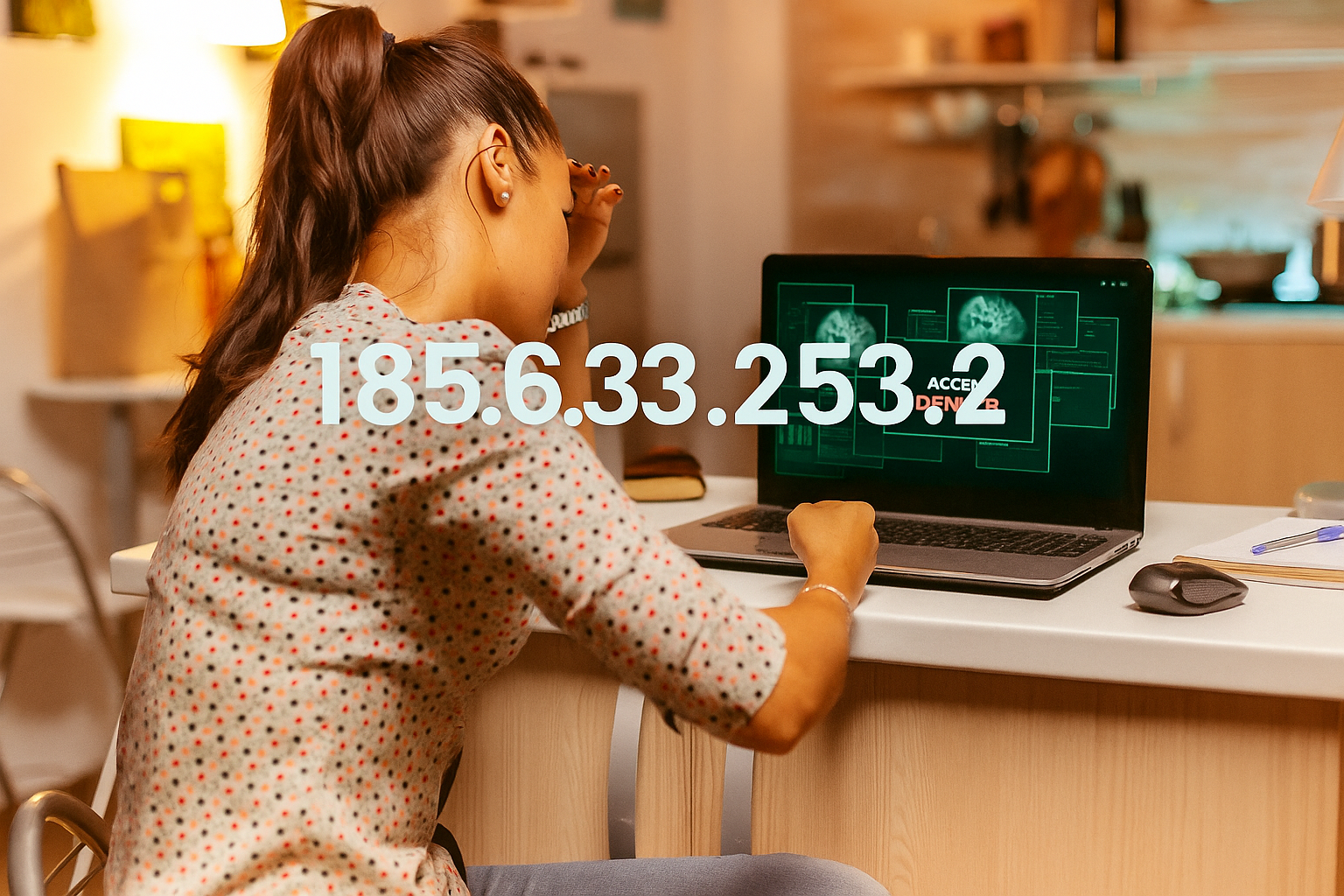If you’ve stumbled upon the IP address 185.63.253.2pp or encountered it in your network logs, you’re likely wondering what it means and whether it poses any security risks. An IP address like this one can be a red flag for network security professionals, web administrators, and anyone managing an online presence. This article breaks down what “185.63.253.2pp” signifies, the security implications it might have, and how you can handle such anomalies effectively.
What is an IPv4 Address and Why is “185.63.253.2pp” Different?
Before diving into the implications of 185.63.253.2pp, it’s crucial to understand what an IPv4 address is and why this particular format stands out.
What is an IPv4 Address?
An IPv4 address is the most common type of IP address used to identify devices on a network. It consists of four numerical sections separated by dots, such as 192.168.0.1. Each section, ranging from 0 to 255, represents a byte in binary form. This address is assigned to every device that connects to the internet, allowing it to send and receive data.
The “pp” Suffix in IP Addresses
When you see an address like 185.63.253.2pp, you might wonder about the “pp” suffix. Typically, IP addresses don’t contain anything other than numeric characters. The addition of “pp” suggests that this is either a misconfiguration, an intentional obfuscation, or malicious activity. This irregular format can appear in logs or requests due to:
- URL encoding errors.
- Malicious actors attempting to mask their true IP address.
- Misconfigured proxies or VPN services that alter the IP structure.
In most cases, this anomaly is worth investigating, especially if it appears unexpectedly in your network logs.
Security Concerns Linked to Unusual IP Formats Like “185.63.253.2pp”
When network administrators and security teams notice an IP address like 185.63.253.2pp, it often triggers concerns related to potential security risks. Here’s why.
How Malicious Actors Use Irregular IP Formats
Cybercriminals are always looking for ways to bypass detection systems and evade security protocols. One tactic they use is manipulating IP addresses. By adding a suffix or slightly altering an IP address format, attackers can:
- Avoid detection by web firewalls or security monitoring systems.
- Bypass spam filters, particularly when IP address reputation is a factor in filtering out unwanted traffic.
- Mask their true identity and evade IP-based bans.
Impact on Website Analytics and Logs
Unusual IP addresses like 185.63.253.2pp can distort web analytics and logs. Here’s how:
- Invalid data entries: The malformed IP address can be counted as a unique visitor, skewing visitor count and analytics.
- Blocked IPs: If the network security system detects and blocks this address, legitimate users may also experience issues accessing the site.
- Referral spam: This kind of anomaly is frequently seen in referral spam, where attackers inject malformed IP addresses into website analytics, inflating traffic numbers.
For website owners, this can mean inaccurate visitor data and the potential for security breaches that go unnoticed due to false positives or negatives.
ALSO READ: What is Milyom? Understanding Its Benefits and Applications
How to Detect and Analyze Anomalous IP Addresses Like “185.63.253.2pp”
If you’ve noticed a suspicious IP like 185.63.253.2pp on your network or website logs, it’s time to dig deeper. Here’s how to detect and analyze such addresses effectively.
Network Monitoring Tools for Identifying Abnormal IPs
To detect irregular IP addresses like 185.63.253.2pp, it’s essential to have the right tools in place. Here are a few common network security and monitoring tools:
- Firewall Logs: Firewalls often record every IP that attempts to connect to your network. Regularly check these logs for malformed or unusual addresses.
- Intrusion Detection Systems (IDS): IDS platforms monitor for abnormal traffic patterns and can alert you when suspicious IP addresses are detected.
- Geolocation Services: Tools like MaxMind or IP2Location allow you to trace the origin of an IP address. They can help identify whether an address like 185.63.253.2pp is coming from an unexpected source.
Steps for Investigating Suspicious IPs
Here’s a step-by-step guide to investigate IP addresses like 185.63.253.2pp:
- Reverse IP Lookup: Use an IP lookup tool to check the owner and the geographical location of the IP address. If it seems suspicious or doesn’t match your expected traffic sources, further investigation is warranted.
- Check for Known Malicious Patterns: Many IP addresses with unusual formats are part of known attack patterns, such as botnets or spam operations. If your security tools flag the address, it’s worth blocking it temporarily until further analysis.
- Monitor for Recurrence: If you notice this type of address repeatedly accessing your network, it’s important to escalate the issue. Repeated access could indicate a persistent threat actor.
Best Practices for Securing Your Network Against IP Address Anomalies
It’s crucial to implement proactive measures to protect your network and website from threats posed by anomalous IP addresses like 185.63.253.2pp.
Implementing Advanced Security Protocols
Here are some security protocols that can help prevent attackers from exploiting malformed IP addresses:
- Firewalls: Set up firewalls to detect and block any traffic from known malicious IP addresses.
- Intrusion Prevention Systems (IPS): An IPS works in tandem with your firewall, blocking suspicious traffic in real-time.
- Rate Limiting: Use rate limiting on your web servers to restrict how many requests an IP can make in a given time frame. This can help mitigate attacks like DDoS or brute force.
Maintaining Accurate Web Analytics
To keep your website analytics accurate despite encountering irregular IP addresses:
- IP Filtering: Use filters to exclude suspicious or malformed IP addresses from your analytics platforms.
- Bot Detection: Tools like Google reCAPTCHA or Cloudflare can help prevent bot traffic from skewing your website data.
By maintaining strict control over your IP filtering and monitoring, you can ensure the integrity of your data and avoid misleading analytics.
What Should You Do if You Encounter an IP Address Like “185.63.253.2pp”?
When you come across an irregular IP address like 185.63.253.2pp, it’s important to take swift action to prevent potential security risks.
Immediate Actions to Take
Here’s what you should do:
- Block the IP Address Temporarily: If you’re concerned about the legitimacy of the address, block it while you investigate further.
- Review Server Logs: Check for other irregularities associated with this IP to see if it’s part of a larger pattern of attacks.
- Report the Incident: If you suspect malicious activity, report it to relevant authorities or your hosting provider for further analysis.
Tools and Services to Address Malformed IPs
Several services can help you identify and manage unusual IP addresses:
- VPN and Proxy Detection Services: These can help identify whether an IP address is coming from a masked or obfuscated source.
- Advanced IP Analysis Platforms: Use these platforms for deeper analysis of suspicious IPs, checking for historical data on the address and its associated activities.
Conclusion: Staying Ahead of IP Address Anomalies and Securing Your Digital Infrastructure
Dealing with irregular IP addresses like 185.63.253.2pp can seem daunting, but with the right tools and knowledge, you can manage these threats effectively. The key is to remain vigilant and proactive about network security, regularly monitoring your logs, and using security protocols to prevent malicious traffic.
By understanding the significance of unusual IP formats, implementing strong security measures, and using effective monitoring tools, you can ensure the safety and integrity of your network and website.
FAQ Section
Q1: What does “185.63.253.2pp” mean?
A: The “pp” suffix is not part of the standard IPv4 address format and usually indicates either a misconfiguration or malicious attempt to obfuscate the true IP address.
Q2: Is it safe to ignore unusual IP addresses in my logs?
A: No. Unusual IP addresses, like those with non-numeric suffixes, could be part of a security attack or data breach attempt. Always investigate.
Q3: How can I prevent security risks from malformed IP addresses?
A: Use firewalls, intrusion detection systems, and IP filtering to block suspicious traffic. Regularly monitor your network logs for irregularities.
Q4: What tools should I use to analyze IP addresses like “185.63.253.2pp”?
A: Use reverse IP lookup tools, geolocation services, and security platforms like MaxMind, Cloudflare, and Google reCAPTCHA to analyze and mitigate risks.
ALSO READ: Understanding znxnz: What You Need to Know About This Trending Term




